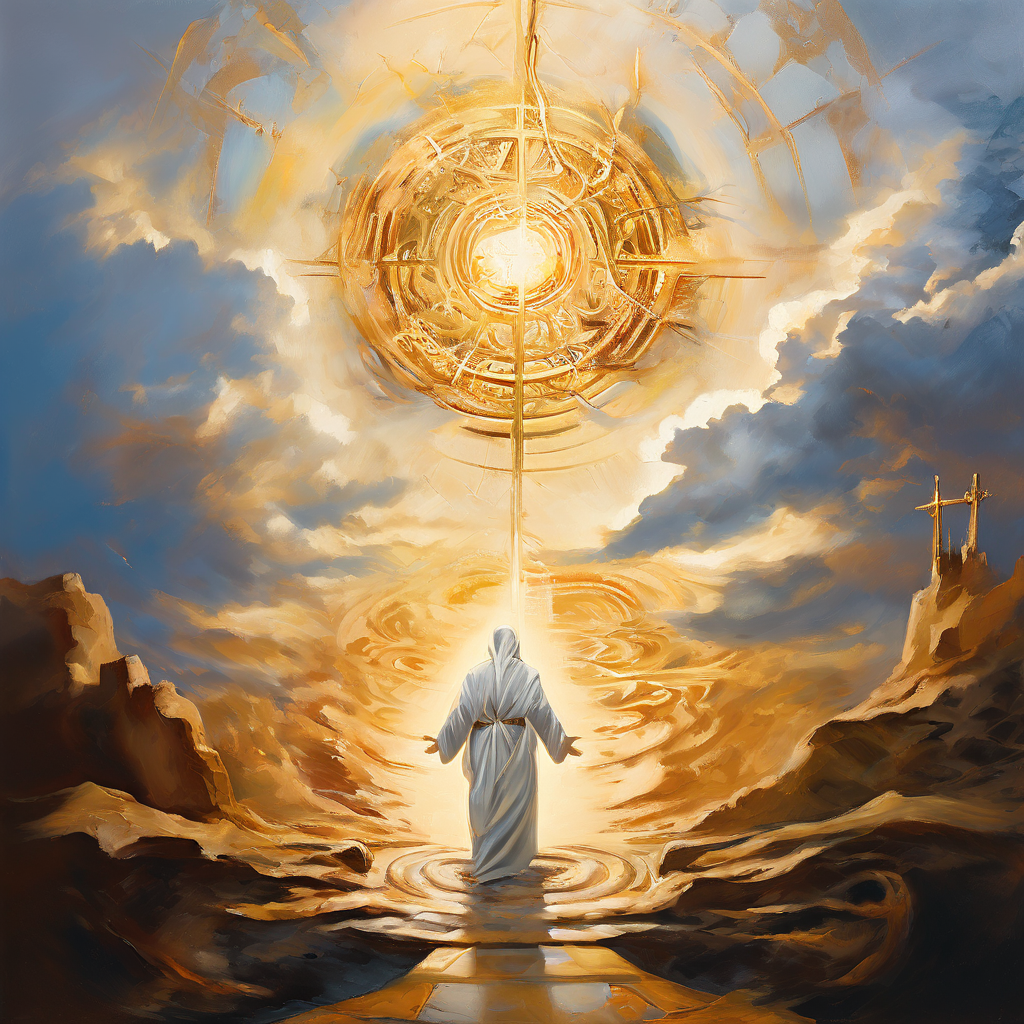Embracing the Divine Light and Paradoxes of Faith
The pursuit of spiritual understanding is a journey that transcends cultural and religious boundaries, often leading us through a landscape rich with paradox and divine revelation.
SPIRITUAL AWARENESS
Nigel John Farmer
5/12/20242 min read


The image of a figure in white, arms outstretched towards a radiant, sun-like emblem, captures this universal quest for truth and enlightenment. While not directly referencing Islamic theology, the artwork resonates with the universal themes of divine majesty, guidance, and enlightenment that are central to Islamic belief, as well as the paradoxical nature of Christian doctrine.
The Divine Attributes in Islamic Perspective
In the Names of God in Islam, the artwork serves as a visual metaphor for the divine attributes celebrated by Muslims. A seeker of truth embraces the divine light and wisdom, akin to the name "An-Nur" (The Light) in Islam, representing God as the source of all light and guidance. The arid landscape evokes the spiritual journey through life's challenges, guided by names like "Al-Hadi" (The Guide) and "Ar-Rashid" (The Righteous Teacher), reflecting God's role in guiding believers. The image's sense of majesty and power connects to names such as "Al-Aziz" (The Mighty) and "Al-Jabbar" (The Compeller), denoting God's overwhelming power and authority.
The Paradoxes of Christian Doctrine
Christian doctrine, rich with profound teachings, presents its own paradoxes that invite believers to a deeper cognitive-spiritual evolution. The concepts of eternal life and being seated at the right hand of God are cornerstones of faith that, upon reflection, reveal a complex interplay of plausibility and implausibility. Eternal life offers hope, yet challenges our finite understanding, while being at God's right hand symbolises divine favour but raises questions about the divine hierarchy.
Cognitive-Spiritual Evolution through Paradox
Engaging with these paradoxical thoughts is crucial for cognitive-spiritual evolution. It encourages a balanced perspective where opposing ideas coexist, transcending binary thinking for a nuanced spiritual understanding. This engagement fosters extraordinary cognitive patterns, flexibility in thought, and a better grasp of spiritual growth's intricacies.
Embracing Paradoxes for Deeper Understanding
The diverse interpretations of religious doctrines across individuals and communities underscore the importance of open dialogue and mutual learning. Cognitive-spiritual evolution is a transformative journey impacting personal growth and spiritual connection. By embracing paradoxical thought and fostering a deeper understanding of religious doctrines, we enhance our spiritual insights and cultivate a profound appreciation for the divine.
Conclusion
The paradoxical nature of religious doctrine, whether Islamic or Christian, presents challenges and opportunities for believers seeking spiritual growth. By engaging with these complexities and cultivating a balanced perspective, we can navigate the intricacies of faith and experience profound cognitive-spiritual evolution. As we embrace paradoxes and deepen our understanding of spiritual truths, we are better equipped to navigate life's complexities and foster meaningful connections with the divine.
Blessings ~ Nigel John Farmer

© 2023~2024~2025~2026 MeditatingAstronaut.com - All Rights Reserved Worldwide
website by Meditating Astronaut Publishing
